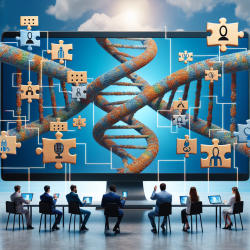In the ever-evolving landscape of genetic research, understanding the intricacies of DNA methylation can be a game-changer for practitioners working with neurodevelopmental disorders. Recent findings from a study on DNA methylation profiles in individuals with rare, atypical 7q11.23 CNVs offer valuable insights that can enhance therapeutic strategies and encourage further research.
Understanding the Research
The study focused on individuals with Williams-Beuren syndrome (WBS) and 7q11.23 duplication syndrome (Dup7), both of which are caused by deletions or duplications in a specific region of chromosome 7. Researchers found that these genetic variations lead to dose-dependent changes in DNA methylation across the genome.
The key takeaway from this research is the identification of specific genes—GTF2I and GTF2IRD1—as significant contributors to these methylation changes. These genes are part of the TFII-I protein family, which plays a role in epigenetic processes that alter DNA methylation on a genome-wide level.
Implications for Practitioners
For practitioners, these findings open up new possibilities for improving therapeutic approaches:
- Targeted Interventions: Understanding the role of GTF2I and GTF2IRD1 in DNA methylation can help tailor interventions that address specific epigenetic changes associated with WBS and Dup7.
- Personalized Medicine: The study highlights the importance of personalized treatment plans based on an individual's unique genetic makeup, potentially leading to more effective outcomes.
- Further Research: Encouraging further exploration into how these genes interact with other epigenetic factors could lead to breakthroughs in understanding and treating related disorders.
Encouraging Further Exploration
This research underscores the importance of continuous learning and adaptation in practice. By staying informed about the latest developments in genetic research, practitioners can better serve their patients and contribute to advancing the field.
For those interested in delving deeper into this topic, I highly recommend reading the original research paper. It provides comprehensive data and analysis that can enhance your understanding and application of these findings in your practice.
Conclusion
The insights gained from this study are not just academic; they have real-world implications for enhancing therapeutic approaches and encouraging further exploration into the genetic underpinnings of neurodevelopmental disorders. By integrating these findings into practice, practitioners can improve patient outcomes and contribute to a deeper understanding of these complex conditions.










